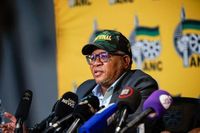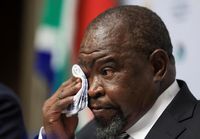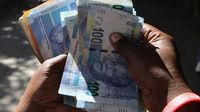The African National Congress (ANC) is facing significant hurdles as it endeavors to secure support for the 2025/26 national budget, with a critical vote set for April 2, 2025. Finance Minister Enoch Godongwana is under pressure to convince various opposition parties to back a budget that includes a controversial 0.5 percentage point increase in Value Added Tax (VAT), which has met with widespread disapproval.
As the deadline approaches, the ANC is reaching out to opposition groups, including the Economic Freedom Fighters (EFF), Build One South Africa (BOSA), and ActionSA, in a bid to garner the necessary votes. The budget is scheduled to be implemented on May 1, 2025, and the ANC's ability to pass it is crucial for maintaining fiscal stability.
In recent discussions, the ANC leadership met with representatives from the uMkhonto Wesizwe (MK) party and other key opposition factions. However, the response has largely been negative. MK's national spokesperson, Nhlamulo Ndhlela, stated, "We made it very clear that we will not entertain a VAT increase and that they must rather put forward other formal proposals which we would then consider." This sentiment echoes across several parties, with many demanding alternative solutions to the proposed tax hike.
ActionSA's national chairperson, Michael Beaumont, was equally critical, arguing, "We do not accept the idea that the South African government should reach further into the pockets of South African people when they have made no effort to cut the inefficiencies and wastages of their own government." Beaumont's party holds six seats in Parliament and has formally rejected the ANC's budget proposal, particularly due to the VAT increase.
The Democratic Alliance (DA), South Africa's second-largest party, has also expressed strong opposition to the budget. DA head of policy Mat Cuthbert confirmed ongoing negotiations but reiterated, "We will not support the budget in its current form." The DA's refusal to back the budget without significant revisions poses a substantial challenge for the ANC, which relies on coalition support to pass legislation.
Political analysts are weighing in on the situation, with Asanda Ngoasheng suggesting that the DA's stance could backfire. She noted, "They have so much to lose as the ANC is getting tired of them blocking everything that is proposed or signed into law." This perspective highlights the delicate balance of power within the Government of National Unity (GNU), where cooperation is essential for effective governance.
In the face of this opposition, BOSA has confirmed its willingness to engage in discussions with the ANC, but with strict conditions. BOSA's acting spokesperson, Roger Solomons, emphasized that their support hinges on the budget serving the best interests of the citizens. "Negotiations about the budget cannot be transactional or bilateral. Only an agreement that addresses the pains of citizens will be accepted by BOSA," he stated.
Moreover, BOSA is advocating for fiscal reforms, including reducing state-owned enterprise bailouts and creating a more efficient government structure. These reforms are aimed at addressing the public's concerns over government spending and inefficiency.
The ANC's budget proposal, which includes a VAT increase that would raise the tax to 16%, has sparked fierce debate. Godongwana announced the increase earlier this month, arguing that it is necessary to bolster the government's revenue in light of ongoing economic challenges. However, critics argue that such measures disproportionately affect lower-income citizens and exacerbate existing inequalities.
As negotiations continue, the ANC is also facing pressure to consider alternative revenue-generating strategies. MK has proposed increasing corporate tax by 1% and expediting the collection of approximately R800 billion in outstanding revenue from the South African Revenue Service. These suggestions reflect a growing demand for the government to explore more equitable taxation methods.
In a broader context, the political landscape in South Africa is becoming increasingly polarized, with various parties aligning against the proposed budget. The EFF has indicated a willingness to enter negotiations with the ANC but insists that such discussions only occur once certain parties, like the DA, are removed from the GNU. EFF secretary-general Marshall Dlamini stated, "We are ready to participate in government, but not with racists," underscoring the tensions within the coalition.
The stakes are high as the April 2 vote approaches, and the ANC's ability to navigate this complex political terrain will be pivotal. With opposition parties firmly rejecting the VAT increase and demanding comprehensive reforms, the party must find a way to unify its coalition while addressing the concerns of its partners.
As the clock ticks down, the ANC remains hopeful that Deputy President Paul Mashatile can persuade dissenting parties to reconsider their positions. However, with the opposition's firm stance and the looming deadline, the path to passing the budget appears steep.
In summary, the ANC's struggle to pass the 2025/26 budget reflects broader tensions within South African politics, where coalition dynamics and fiscal policies are increasingly contentious. The outcome of this budget vote will not only impact the government's financial stability but also shape the political landscape in the months to come.




